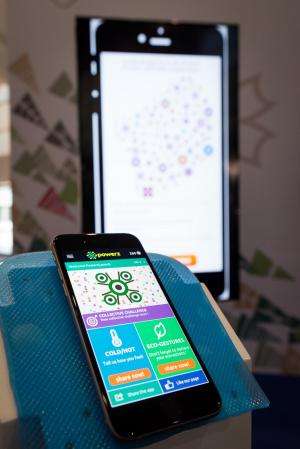NTU develops mobile app to help the university reduce its energy usage

Feeling too cold? With just a few taps on Nanyang Technological University's (NTU) new mobile app, the central air-conditioning temperature settings could be adjusted, helping the university save on its energy bills.
By playing eco-games on the app - POWERZ, students, professors and staff will be providing information that will help the university conserve power such as indicating empty lecture theatres with lights turned on and venues where the air-conditioning is too cold.
The information will be relayed to NTU's facilities management department who will be able to make changes to the settings and conserve energy university-wide.
The researchers behind this new app have also carried out energy tests at NTU's academic buildings and it shows that the app could potentially save the university about $2 million a year in energy consumption.
The app is part of NTU's commitment to sustainable development through its EcoCampus initiative, which aims to achieve a 35 per cent reduction in its energy and water usage, carbon footprint and waste output by year 2020.
NTU Chief of Staff, Professor Lam Khin Yong, said, "This app combines everyday user behaviours and gamification to achieve NTU's larger objective to conserve energy."
"Every bit of effort counts, and by involving the whole campus community through crowdsourcing, we not only increase their awareness on the various ways to save energy in offices, laboratories and homes, but also improve energy efficiency."
The new app was launched today by the Minister for Water and Environment Resources, Dr Vivian Balakrishnan, at NTU's GreenFest 2015, the annual flagship event of Earthlink NTU.
Double rewards for gaming
Designed as a massively multiplayer online role-playing game, each player will get to create their own virtual avatar and score points to unlock further customisation options by playing in-game activities.
The in-game activities pit users against each other, where they score points through environmentally-friendly behaviours such as using fans instead of air-conditioning in residential halls.
Apart from daily activities, there are also weekly challenges that keep users on their feet, such as a virtual race to switch off all the lights in empty rooms around the campus.
Students and staff can track their own and friend's progress through a campus-wide leaderboard, and strut their elaborate avatar design on a real-time interactive campus map.
The app not only helps raise awareness on energy conservation such as how 10 per cent of electricity bills is cut for every degree Celsius raised when using air-conditioning, but also allow users to earn tangible rewards.
Students and staff playing the app can earn points which can be be redeemed for lucky draws and food vouchers. There are plans to exend the range of rewards for students who play the game, such as book and transport vouchers.
Associate Professor Yohanes Eko Riyanto, Principal Investigator for the POWERZ project said, "Simple everyday actions such as switching off the lights and taking the stairs instead of the lift, can go a long way in creating a more sustainable future. The app provides a fun and exciting way to nudge people to be more environmentally conscious".
New model for energy conservation by the community
POWERZ introduces a new concept of empowering individuals to play a direct role in energy conservation through crowdsourcing. This new model of community engagement could also be used by other organisations to generate energy savings. There are also plans to extend the application for island-wide use, such as in schools and even HDB households.
Mr Nilesh Jadhav, Programme Director NTU's Ecocampus initiative said, "This remarkable concept can be extended to other campuses and even housing precincts in Singapore to engage and inform users on the importance of conserving energy. With almost 87 per cent of Singaporeans using smartphones, mobile apps will play a pivotal role in making Singapore a more sustainable society to live in."
The POWERZ app is developed in collaboration with the GDF SUEZ Lab Singapore, which develops innovative solutions to meet the energy challenges of South East Asia.
Raphael Schoentgen, Member of the Executive Committee and Director of Research & Technologies at GDF SUEZ said, "With this project, GDF SUEZ aims at raising citizens' awareness on energy efficiency and reduce buildings' consumptions at the same time, which is a welcomed challenge. This collaboration with NTU is an important opportunity for us to test an innovative solution in that could be extended to other universities, and perhaps the world."
Provided by Nanyang Technological University



















